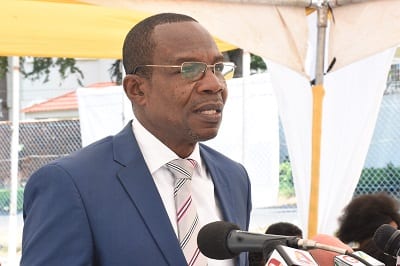A directive given to media firms to delete stories that cast justices of Ghana’s highest court in a negative light has been identified as scandalous by the Ghana Journalists Association (GJA).
Lawyers from Ghana’s Legal Service, Sory@Law, issued the order on behalf of the Court.
They say that some media reports include “a series of incendiary, hateful, and insulting comments and speeches…against the Justices.”
“The GJA is, to put it mildly, dumbstruck in reading this obnoxious directive pregnant with sinister threats to media freedom in Ghana, which is touted as a land of freedom and justice,” President of the GJA Affail Monney said at a press conference in Accra on Monday March 1. This is scandalous, with all due respect.”
“Unsurprisingly, our phones have been overwhelmed with calls from journalists, media advocacy groups, and supporters of press freedom and free speech, everyone wanting to know what was going on since the Judicial Service’s controversial statement was released.
“It is widely accepted that the right to freedom of speech is not absolute, nor conditional. And legal experts teach us that such credentials must be in compliance with the law, obey due process, and be used to achieve valid goals and objectives.
“In drafting the scandalous comment, the GJA is primarily of the opinion that the Judicial Service should have avoided any perception or circumstance that has the potential to instill fear and foster a culture of silence, which Ghana was enveloped in during the time of autocratic misrule,” according to the GJA.
“They claim that criticism is a gift that all branches of government require. Denying the judiciary the gift would be a miscarriage of justice. ‘The bare reality is better than a well-dressed lie,’ said Ann Landers.
‘The naked truth is that the judiciary is not immune to criticism in this context. However, critique must be presented in a way that does not jeopardize the administration of justice. To that end, the GJA encourages the media to remain cool and not be seduced into scandalizing the court with irrational statements or verbal stones, no matter how inflammatory the Judicial Service’s statement might be.”
The full statement is below…
IN REACTION TO THREATS AGAINST THE MEDIA BY THE JUDICIAL SERVICE, GJA PRESIDENT AFFAIL MONNEY MADE A Comment AT A PRESS CONFERENCE HELD AT THE GHANA INTERNATIONAL PRESS CENTRE ON MONDAY, MARCH 1, 2021.
Members of the GJA National Executive, esteemed members, ladies and gentlemen, good morning.
A warm welcome to senior members and veterans of our profession who have joined us at the Ghana International Press Centre, a bastion of our democracy and a citadel of press freedom and free speech.
The Judicial Service released a statement ordering the media to “immediately pull down” from their platforms “statements and speeches that express, and/or insinuate hateful, spiteful, vengeful, incendiary communication against justices of the Supreme Court, especially those hearing the election petition.” Furthermore, such comments and speeches must not be released by the media. The Judicial Service then threatened to take “appropriate steps to ensure that the media would not violate the right to free expression,” according to the Judicial Service.
Members of the public, please stand up. To put it mildly, the GJA is dumbfounded by this obnoxious order, which is pregnant with insidious threats to media freedom in Ghana, which prides itself on being a land of freedom and justice. This is scandalous, to say the least.
Unsurprisingly, our phones have been overwhelmed with calls from journalists, media advocacy groups, and supporters of press freedom and free speech, everyone wanting to know what was going on after the Judicial Service’s controversial statement was released.
It is generally accepted that media freedom is not absolute, but rather conditional. And legal experts teach us that such credentials must be in compliance with the law, obey due process, and be used to achieve valid goals and objectives.
The GJA believes that the Judicial Service should have avoided any perception or circumstance that has the potential to instill fear and encourage a culture of silence, which Ghana was embroiled in during the time of autocratic misrule, in drafting the scandalous comment.
They believe that criticism is a gift that all branches of government require. Denying the judiciary the gift would be a miscarriage of justice. “The bare reality is better than a well-dressed lie,” Ann Landers once said.
In this case, the plain truth is that the legal system is not immune to criticism. However, critique must be presented in a way that does not jeopardize the administration of justice. To that end, the GJA encourages the media to remain calm and not be seduced into scandalizing the court with unhinged statements or verbal stones, no matter how proactive the Judicial Service’s statement might be.
Read Also: Western North Region Records 21 New COVID-19 Cases And One Death
The GJA would like to remind its members that rather than acting on threats or coercion to “immediately pull down” from their platforms as requested, the media should behave in compliance with the GJA Code of Ethics, which states that “A journalist corrects inaccuracies and errors at the earliest opportunity and provides a chance for a rejoinder and/or an apology as appropriate.”
It is ingrained in our minds that the judiciary has the right to hold any erring journalist or media organisation in contempt, provided that acceptable procedures and processes are followed. Any unprecedented or antiquated practice that smacks of censorship, coercion, or resuscitation of the culture of silence, which can have unforeseen sociopolitical implications, should be avoided at all costs in this context. The GJA is unmistakably of the opinion that the Judicial Service’s attacks against the media contradict logic and lead to an unjustified attack on all tenets of freedom of expression and freedom of the press guaranteed by the 1992 Constitution.
If not immediately reversed, the judiciary’s ill-advised, ill-timed, ill-crafted, and ill-issued statement could cause a tsunami, lowering the court’s prestige in the eyes of freedom lovers and critical people, polluting the media climate, undermining our impressive global media rankings, and dimming the beacon of our democracy.
SOURCE: ATLFMNEWSONLINE



























